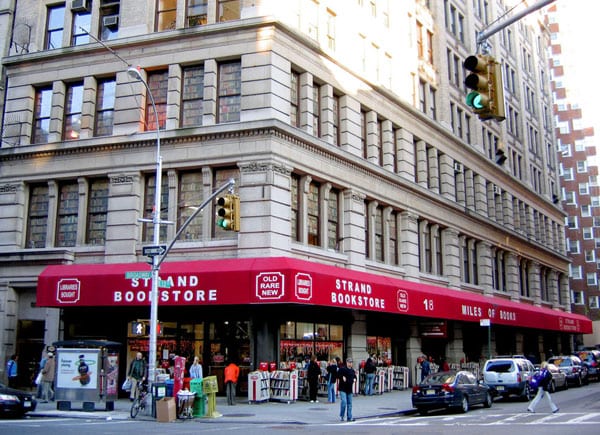
December 4, 2018; Gothamist and Hyperallergic
New York’s most famous bookstore, The Strand, houses 18 miles of bookshelves and decades of literary history in a classic steel-frame building in Greenwich Village. Nancy Bass Wyden is the third generation of the Bass family to own the store; her father bought the building at 826 Broadway for $8.2 million to avoid being priced out of the neighborhood by rising rents. According to Wyden, the latest danger to the Strand isn’t rising costs or a decline in readership, but the New York Landmark Preservation Commission.
As tech firms move in and redevelop buildings in the city, the committee is scrambling to keep some of old New York alive. According to Zachary Small at Hyperallergic, “Preservationists have called for the landmarking of over 200 buildings south of Union Square.” The Strand is one of those buildings, but Wyman says that becoming a historic landmark would “imperil [her] business model and prevent needed expansion.”
Corey Kilgannon at the New York Times pointed out that becoming an historic landmark drives up renovation and maintenance costs, not to mention the hassle of extra forms and permits. The Preservation Commission offers grants to homeowners and nonprofits for preservation and just proposed a streamlined version of its rules, but the Strand is not a nonprofit and Wyman says all the designation would do is “cost us in bureaucracy, time, money, and uncertainty.”
As NPQ has documented, historic landmark designation can sometimes slow gentrification by preserving buildings that otherwise might be torn down to make space for luxury condos. It’s a complicated issue, though, because neighborhoods full of historic landmarks can become more desirable and drive up prices. A study from the Journal of the American Planning Association found that in New York, “historic preservation can contribute to economic revitalization in urban neighborhoods, but that these changes risk making neighborhoods less accessible to lower-income residents.”
Sign up for our free newsletters
Subscribe to NPQ's newsletters to have our top stories delivered directly to your inbox.
By signing up, you agree to our privacy policy and terms of use, and to receive messages from NPQ and our partners.
The owners of the Strand have historically been committed to preserving the building as it is. Their staff is unionized and paid a living wage, signaling a commitment as a community partner, although they have been hostile to people sleeping on their sidewalks.
Wyman pointed out that as this potentially expensive designation is being considered, Amazon was awarded billions of dollars in tax incentives for its new headquarters in Queens.
“The richest man in America, who’s a direct competitor, has just been handed $3 billion in subsidies. I’m not asking for money or a tax rebate,” said Wyden, “Just leave me alone.”
Clearly, as Wyden suggests, if New York City can afford to subsidize Amazon, it can also afford to compensate the Strand for any expenses historic preservation status might bring. But that begs the question, as NPQ’s Anne Eigeman noted not long ago, of whom the city aims to serve.—Erin Rubin













